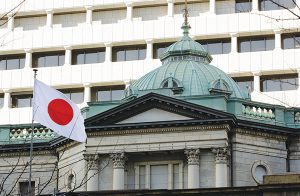Bloomberg
The yen rebounded from near a 24-year low on signs the Bank of Japan is preparing an intervention to prop up the currency.
The central bank conducted a so-called rate check in the currency market, meaning officials called asking for an indicative price at which it could intervene, according to a person with direct knowledge of the events.
The yen climbed 0.8% to 143 against the dollar in New York. A breach of 145 would bring 146.78 into play, the level reached before a joint Japan-US intervention to support the yen back in 1998.
Japanese authorities have been stepping up verbal warnings with the yen down almost 20% against the dollar this year, but these have failed to turn the tide. The actions, which included stern comments from both the finance minister and the nation’s top currency official, come as traders question how effective any intervention would be, especially if it was unilateral and without the backing of the US.
“While the rate check report probably is a precursor to actual intervention, it isn’t likely to lead to an immediate action and is just a hearing and an extension of verbal intervention,†said Akira Moroga, manager of currency products at Aozora Bank in Tokyo.
Finance Minister Shunichi Suzuki said around lunchtime that Japan wouldn’t rule out any response if current trends continued and those options included stepping into markets, a warning he repeated later in the day.
Asked about intervention in the evening, Suzuki said, “It’s not something we’ll give prior warning for beforehand. Normally we wouldn’t say whether we’ve done it or not either. But when we do, we’ll do it without hesitation, and swiftly.â€
Suzuki declined to comment on whether the finance ministry had asked the BOJ for a
rate check. Governor Haruhiko Kuroda refrained from talking to reporters about the weak yen after a panel on the economy in Tokyo.
A rate check by the BOJ serves as a warning for the market to avoid one-way bets. It usually happens when volatility increases and verbal intervention may not be sufficient.
The BOJ made the call after top currency official Masato Kanda had spoken at the start of the day, according to a person with direct knowledge of the event. In Japan, the finance ministry decides whether to intervene in the market and the central bank does the actual buying or selling. The Nikkei earlier reported the checks.
Still, economists say the chance for intervention is low.
The impact of the stronger dollar wasn’t just confined to Japan, with officials across Asia busy trying to bolster their currencies. A tumble in South Korea’s won sparked comments from officials there that they were closely monitoring markets.
 The Gulf Time Newspaper One of the finest business newspapers in the UAE brought to you by our professional writers and editors.
The Gulf Time Newspaper One of the finest business newspapers in the UAE brought to you by our professional writers and editors.
